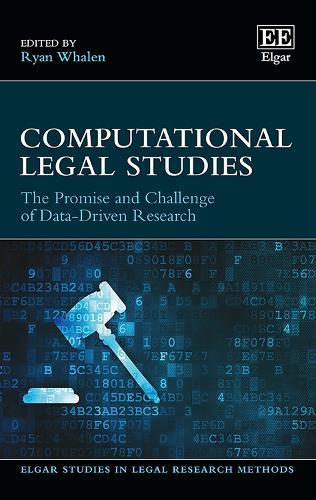Overview
Computational Legal Studies offers a visionary introduction to the computational turn in law and the resulting emergence of the computational legal studies field. It explores how computational data creation, collection and analysis techniques are transforming the way in which we comprehend and study the law, and the implications that this has for the future of legal studies. Featuring contributions from a diverse set of experts, this thought-provoking book considers the implications of computationally enabled research and the future trajectory of the field. It discusses how technological, scientific and methodological developments are not only making the traditional practice of law more efficient but are also creating new perspectives on the law and shaping how we understand it. Chapters draw on a range of examples of computational legal research to demonstrate how a wide variety of research methods, including natural language processing, machine learning, agent-based modelling, and network analysis, are transforming the relationship between law and computation. This book will prove to be a stimulating read for legal academics looking for a better understanding of this emerging field and for law students interested in new legal research techniques. It will also be a valuable resource for legal firms and computational social scientists interested in examining how law is adopting computational methods.
Full Product Details
Author: Ryan Whalen
Publisher: Edward Elgar Publishing Ltd
Imprint: Edward Elgar Publishing Ltd
Dimensions:
Width: 15.60cm
, Height: 2.50cm
, Length: 23.40cm
Weight: 0.676kg
ISBN: 9781788977449
ISBN 10: 1788977440
Pages: 384
Publication Date: 18 September 2020
Audience:
Professional and scholarly
,
Professional & Vocational
Format: Hardback
Publisher's Status: Active
Availability: To order

Stock availability from the supplier is unknown. We will order it for you and ship this item to you once it is received by us.
Reviews
'Long overdue and perfectly timed, this book connects daring ideas with cutting edge research methods to examine legal developments and legal practices. It is an indispensable companion for those who are interested in the fast-developing world of computational techniques that change the way we understand and practice law. It provides a vital tool to those who wish to explore the basics, the developments, the novelty, the variety, and the implications of these techniques for the new legal and social reality.' -- Urska Sadl, European University Institute, Italy
'This book situates computational analysis of law among overlapping research areas and deepens one s sense of the field as vitally distinct. The field is equally transnational and transubstantive, and the legal texts of interest are transmodal (spanning cases, statutes, administrative regulations, and much else). Each chapter reflects all those rich variations, while also highlighting the field s core methods. It is, and will continue to be, an important reference volume for those who hope to produce or consume the best computational legal studies.' --Joseph Scott Miller, University of Georgia, School of Law, US'Long overdue and perfectly timed, this book connects daring ideas with cutting-edge research methods to examine legal developments and legal practices. It is an indispensable companion for those who are interested in the fast-developing world of computational techniques that change the way we understand and practice law. It provides a vital tool to those who wish to explore the basics, the developments, the novelty, the variety, and the implications of these techniques for the new legal and social reality.' --Urska adl, European University Institute, Italy
'This book situates computational analysis of law among overlapping research areas and deepens one's sense of the field as vitally distinct. The field is equally transnational and transubstantive, and the legal texts of interest are transmodal (spanning cases, statutes, administrative regulations, and much else). Each chapter reflects all those rich variations, while also highlighting the field's core methods. It is, and will continue to be, an important reference volume for those who hope to produce or consume the best computational legal studies.' -- Joseph Scott Miller, University of Georgia School of Law, US 'Long overdue and perfectly timed, this book connects daring ideas with cutting-edge research methods to examine legal developments and legal practices. It is an indispensable companion for those who are interested in the fast-developing world of computational techniques that change the way we understand and practice law. It provides a vital tool to those who wish to explore the basics, the developments, the novelty, the variety, and the implications of these techniques for the new legal and social reality.' -- Urska Sadl, European University Institute, Italy
Author Information
Edited by Ryan Whalen, Faculty of Law, University of Hong Kong




